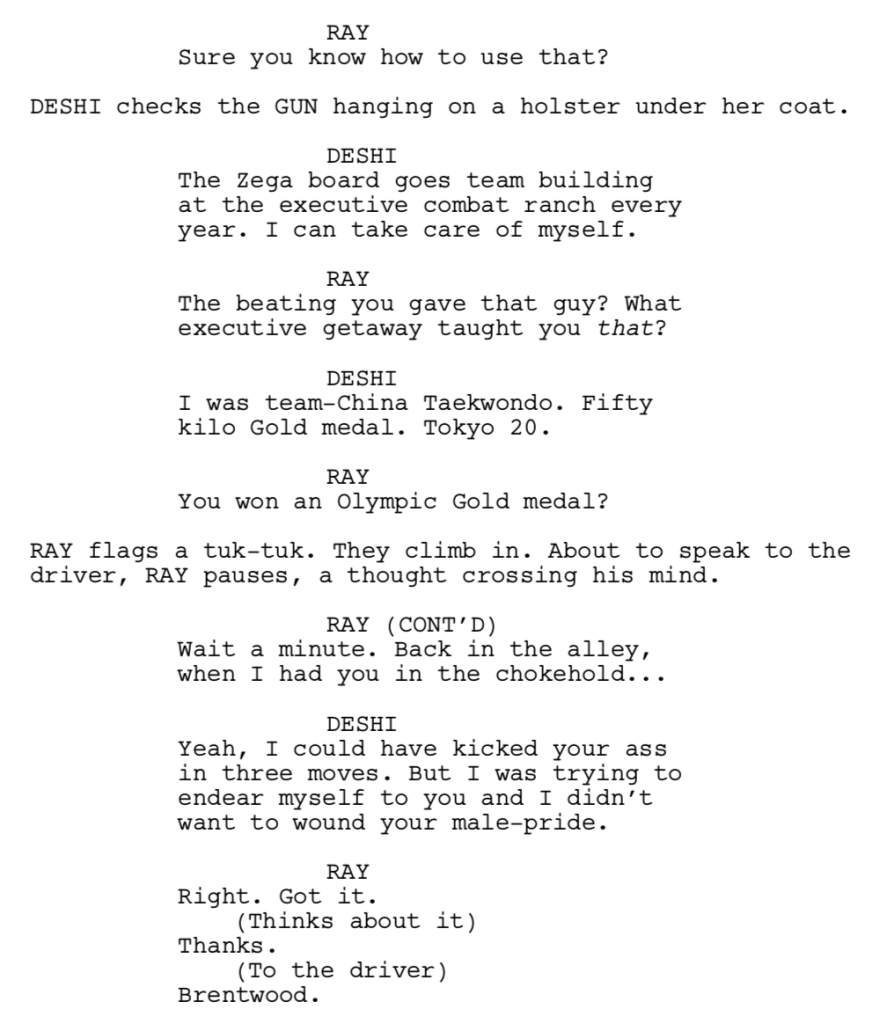Genre: Drama/Crime/Shades of Sci-Fi
Premise: (from Hit List) After America goes bankrupt and millions flee the country, a Chinese billionaire hires an American PI to rescue his daughter in the American ghetto of Hong Kong.
About: Today’s script finished with 8 votes on last year’s Hit List. The writer, Rowan Athale, wrote and directed the 2012 indie film, Wasteland. He more recently finished directing the film “Strange But True,” about a woman who surprises the family of her deceased boyfriend by telling them she’s pregnant with his child. That film stars Amy Ryan and Brian Cox. This script was purchased by Platinum Dunes and Universal.
Writer: Rowan Athale
Details: 110 pages
The Little America sale reminds me of the good old days when studios used to buy any spec that contained a high-concept premise with potential. Nowadays, concept isn’t as important as the spec fitting into a handful of narrow genres Hollywood likes to market. Guy with a gun. Contained Horror. Cheap but thoughtful sci-fi. Biopics.
And as much as I hate to admit it, I’m becoming more infected with that groupthink. When I saw this idea, I thought, “Great if this were 1999. But it’ll never get made in 2018.” It simply doesn’t fit into any category Hollywood likes to market. I know I harp on this all the time, but it’s reality. If your script doesn’t fall into a type of film that you’ve seen Hollywood roll out an advertising campaign for at least once a year, you’re writing uphill.
It reminds of that film with Miles Teller and Jonah Hill – War Dogs. Did anybody see that movie? Of course not. Why? Because it didn’t fit into any clear marketing campaign. Which means Hollywood didn’t know how to market it. Which means general audiences had no idea what they were going to see. And when you don’t know what you’re gonna see, you don’t go.
Now some of this is starting to change with Netflix. They’re making movies Hollywood has no idea what to do with. So I guess that’s good for writers writing outside the norm. My question is: Is that a good thing? Is Netflix actually making good movies? I know Larry the Lyft Driver thinks they are. But do you? We’ll see what Universal ends up doing with this project. But, in the meantime, let’s find out if the script is any good.
Ray Cobb works at a fishing cannery in Little America, Hong Kong. That’s right. The year is 2028. American has gone bankrupt because giant conglomerates drove it into the ground. China offered a lifeline to rich Americans fleeing the chaos. But within a decade, many of the Americans who made it to China now work blue collar jobs, including Ray.
After Ray gets in a fight with a group of rich racist Chinese men on a train, he’s sent to prison, only to get pulled out by his old boss, Winters. We find out that when America was falling apart, Ray became an enforcer to make ends meet. He quit that job and fled to Little America. But Winters has found him again, and needs him for a job.
The job is simple. The heir to one of the biggest car manufacturers in China needs someone who knows Little America to find his daughter, Hun, who recently disappeared in the squalid ghetto. Since Ray knows the area better than anybody, he’s called in to help. But he won’t be able to work alone. He’s teamed up with Hun’s sister, Deshi, the emotionless heir to the car fortune.
In order to find Hun, the two must figure out why Hun would head to such a decrepit part of the city in the first place. She’s basically Chinese royalty. At first, they assume she’s been kidnapped for ransom, but when Ray pays visits to the usual gangster suspects, he believes that there’s something more nefarious at play here.
Despite numerous attempts to send Deshi to the bench so he can get dirty, he learns that the emotionless Deshi’s plight is more personal, as she believes that her disconnect from humanity, and by association, her family, is what drove Hun away in the first place. She must save her sister if only to let her know that she loves her.
Let me start off by saying that any script that references In and Out within the first three pages is AUTOMATICALLY elevated to ‘worth the read’ status. So smart move by Athale there.
Today I want to talk about the difference between ideas that give initially versus ideas that keep on giving. An idea that keeps on giving is something like The Hangover. The concept of three guys who have no recollection of the prior night attempting to piece together that night through a series of clues plays to the concept’s strengths throughout. Scene after scene has them going to places they don’t remember, and we enjoy trying to figure out how this place is involved in their pursuit just like they do.
Contrast that against something like Little America, whose idea gives A LOT initially. There’s a cool setup with America going bankrupt and a bunch of Americans fleeing to China – all of whom are now considered low-lives and live in the ghetto. That’s very high concept. However, once we get past that setup, there’s nothing left for the concept to offer. We’re in yet another gang-ridden city with two people trying to solve the mystery of a missing girl. We’ve seen that movie before. So there’s nothing new or fun to play with.
The whole purpose of coming up with a high concept is to be able to play within the specifics of that concept throughout the script’s running time. In Jurassic Park, you don’t set up an island of dinosaurs then watch a bunch of guys hanging out at the docks. No. You come up with a series of kick-ass dinosaur sequences. Or, to use a more relevant example: Killing on Carnival Row – another script about a guy needing to descend into the dark reaches of a squalid city to solve a crime. That script exploits the uniqueness of its concept on every single page. You wouldn’t be able to confuse it with any other movie.
That was my biggest problem with Little America. With the exception of the setup and the reason for Hun’s disappearance, it’s a movie I’ve already seen.
BUT.
It still kept my interest. Not in an “oh my God, everyone has to read this” sort of way. But the writing was sophisticated enough to build a compelling mystery that I needed answers for. I loved how Ray was honorable yet had no problem getting dirty if the situation called for it. And I liked the idea of this billionaire heiress mixing it up with the common folk to save her sister. And the characters never felt written. There was an honesty to the way they were approached that made me give a shit. I don’t often see that in a script like this.
Athale was also able to exploit that all-too-necessary sexual tension between the leads. It sounds silly. But if you can nail that? It’s one extra reason for the reader to keep reading. If the reader wants those characters to get together, they might stick around just to see if that happens. The trick is you can’t go overboard. You can’t be all wink-wink flirty-flirty every single line. It’s got to be just under the surface. That restraint is what draws us in, is what gives us just enough doubt that we have to keep reading to know for sure.
I still remember that screenwriting book from 20 years ago. I think it was called “Like it, Didn’t Love It.” It was written by an executive who was pointing out that the large majority of scripts were rejected because they were “like-it-didn’t-love-it” scripts. The book was about what you needed to do to turn a like-it-didn’t-love-it script into a love-it script. Long story short, it was getting the characters right. But, actually, there’s a bigger lesson to learn from that book, which I’ll share in a minute. In the meantime, I’ll say that this script didn’t quite deliver on the promise of its premise. But the writing and characters were strong enough to keep me engaged.
[ ] What the hell did I just read?
[ ] wasn’t for me
[x] worth the read
[ ] impressive
[ ] genius
What I learned: As I was saying – the reality is only a fraction of screenplays in Hollywood are “love-it” scripts. The overwhelming majority of scripts written by professionals are “like-it-didn’t-love-it” scripts. Due to the reality that Hollywood needs to push product, many of these scripts get made. So the question is, how do you write a “like-it-didn’t-love-it” script that still gets purchased? And the answer is… concept. The flashier the concept, the more likely someone’s going to bank on that “okay script” breaking out. On the contrary, a “like-it-didn’t-love-it” script with zero concept has virtually no chance of getting purchased. I suspect this is why Little America sold.




